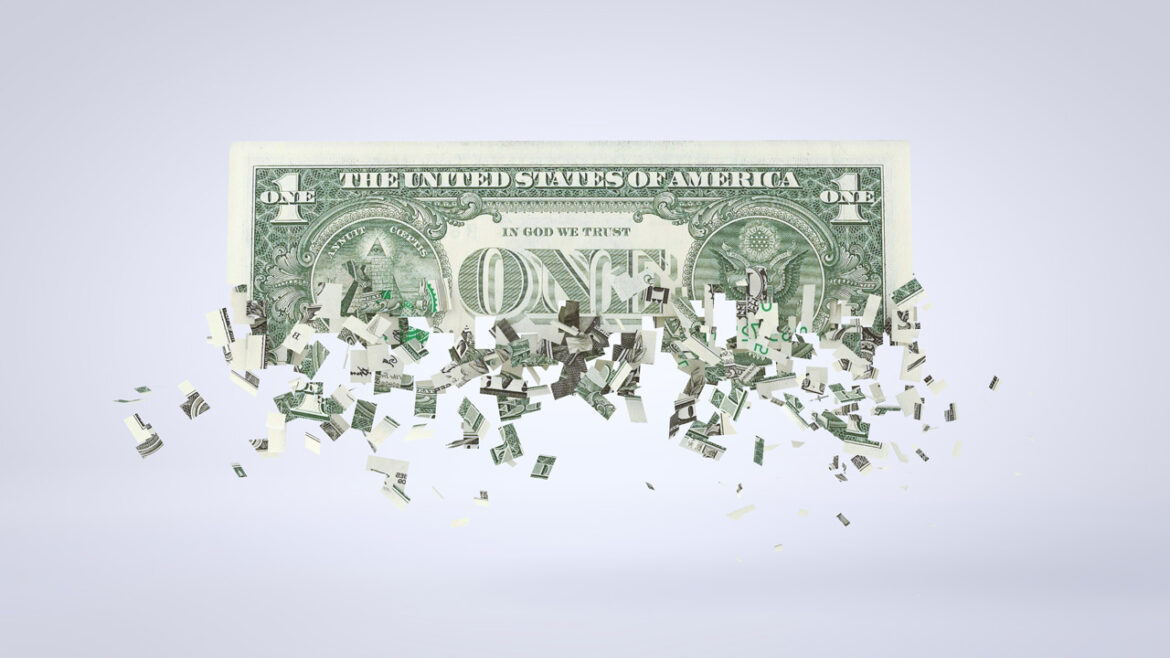Gold has all the potential to go unprecedentedly high. But silver will be gold on
Site:
Precious metals news
Aug 7, 2023 - 09:01:53 PDT
Major US banks, including JPMorgan Chase and Bank of America, have seen a $262 billion drop in customer deposits. In contrast, Kansas's Heartland Tri-State Bank failed, with Dream First Bank, N.A. assuming its assets and deposits. While big banks are losing deposits, JPMorgan still reported a 67% rise in quarterly profits. Analysts believe smaller banks are attracting customers by offering better rates.
Goldman Sachs, JPMorgan Chase, and other lenders are facing challenges in selling commercial real estate debt due to rising concerns about the sector's stability. The shift to remote work and job cuts have particularly impacted office property values, causing a market slowdown. While many banks are looking to offload such loans, possibly at discounts, actual distressed sales remain limited. The uncertain valuation of these assets has also led some lenders to stop issuing new commercial real estate loans altogether.
Increasing numbers of Americans, unable to access their funds, are turning to local news outlets for assistance. A CBS News report highlighted several bank customers, including Charlotte Warren, Peter Spyropolous, and Gene Krichevsy, who struggled for months or years to access their accounts. In total, almost $90,000 was inaccessible to them. Once CBS intervened, the banks quickly resolved the issues.
A looming fiscal standoff in Washington could disrupt the Federal Reserve's upcoming policy decisions and further dent America's global economic reputation. Fitch Ratings recently downgraded the US debt's AAA status, intensifying political tensions over spending. With Congress not addressing these issues, the risk of a government shutdown after September 30 rises. This situation could affect the Fed's September interest-rate decision and impact consumer spending and GDP growth.
Aug 7, 2023 - 07:07:48 PDT
Lenders still tapping hundreds of billions of dollars of funding that shored industry up during recent crisis. US banks remain heavily dependent on government funding, even after Silicon Valley Bank's collapse and subsequent positive market indicators. Despite improved share prices and Q2 earnings, banks' loans from the Federal Home Loan Banks stood at $880bn by June, down from $1tn in Q1 but up 150% from 2021. Critics caution this reliance promotes excessive risk, citing failures like SVB and Signature Bank.
China increased its gold reserves for the ninth consecutive month in July, adding 23 tons. The total now stands at 2,137 tons. This consistent buying by China's central bank supports gold prices, countering the usual dip caused by global rising interest rates. The World Gold Council foresees central banks continuing to boost their gold reserves, further bolstering gold's outlook.
China faces a mounting municipal debt crisis, with local governments deep in debt following excessive infrastructure spending. Local government debt reached $12.8 trillion (76% of GDP) in 2022, up from 62.2% in 2019. To tackle the crisis, Beijing considers measures like bond issuance, loan rollovers, and possibly using central funds. But aiding local bodies might encourage more reckless investments. Comprehensive economic reforms are needed to address the core issue.
The Federal Reserve advertises itself as "independent" and above the political fray.We all know this isn't true.The Fed is inherently political and makes decisions based on political calculations as much as economic data.
Last week, Fitch Ratings downgraded the US’s long-term credit rating from AAA to AA+. While the downgrade won't significantly impact the US government's ability to borrow, it should serve as a wake-up call because there is a much bigger problem looming on the horizon: a market-driven downgrade of the US dollar.
The global push for currency diversification has gained momentum since 2008, peaking in 2022. The upcoming BRICS Summit will address the heavy world reliance on the US dollar for trade and central bank reserves, seeking alternatives. While the US promotes the dollar's primacy, history indicates no currency remains dominant forever. BRICS nations aim for financial system diversification, not dollar elimination. As part of this move, some countries, particularly those sanctioned by the US, have reduced their dollar reserves, often opting for gold. The goal is a balanced global monetary system.
Aug 7, 2023 - 05:49:50 PDT
Gold prices are rising, and central banks worldwide are buying in record numbers. The World Gold Council reports 387 tons purchased in the first half of the year. This surge is driven by global "de-dollarization" strategies, especially in the face of U.S. Federal Reserve's interest rate hikes. China and emerging markets, in particular, are increasing their gold reserves to stabilize their economies and reduce reliance on the U.S. dollar. The trend also supports the internationalization of the Chinese yuan.
Global bank shares plummeted after Moody's downgraded 10 mid-sized U.S. banks due to concerns about the sector's stability, including rising funding costs and a potential decrease in deposits. This comes after the failure of three U.S. lenders earlier this year. Furthermore, Italy's unexpected decision to impose a 40% tax on banks' profits from higher interest rates caused significant drops in European bank stocks. Major banks in both the U.S. and Europe saw shares fall, reflecting broader investor apprehension.
 CRITICAL SILVER MARKET UPDATE AUG 6th: Powerful Forces Setting Up For Much Higher Silver Prices
CRITICAL SILVER MARKET UPDATE AUG 6th: Powerful Forces Setting Up For Much Higher Silver PricesAugust 6, 2023
Powerful forces are setting up for much higher silver prices, while the Major Market participants are totally unaware. Critical changes are taking place in the silver market, especially in the world's largest silver producer, which I discuss in my newest "Weekend Update"....
Don't be misled by current silver price trends; a significant upswing is on the horizon in a monthly chart. With the Federal Reserve's limits on monetary tightening and persistent double-digit deficits, it's inevitable that inflation will surpass usual levels.
This economic climate is likely to favor tangible assets and high-quality resource businesses. Given that the gold-to-silver ratio is at a historical high of 82, it underscores silver as an incredibly appealing segment of the commodities market.
 Gold Should Succeed in Overcoming Its All-Time High of $2,075 in 2024: Commerzbank AG
Gold Should Succeed in Overcoming Its All-Time High of $2,075 in 2024: Commerzbank AGAug 4, 2023 - 13:01:47 PDT
Since last fall, gold prices have shown a significant rebound. Commerzbank's economists have shared their predictions on the trajectory of this precious metal.
In the near term, gold prices are expected to hover around $1,950, due to ongoing uncertainty about the direction of U.S. monetary policy. While declining U.S. inflation could bring an end to interest rate increases, the persistent strength of the U.S. economy suggests a rapid shift in interest rates is unlikely.
However, the outlook for the medium term suggests an uptick in gold prices. Given the anticipation of a U.S. economic downturn, speculation about potential interest rate reductions should support a rise in gold prices.
The U.S. fiscal health is worsening with a Federal Deficit run rate of $2.25 trillion. High interest costs, driven by rate hikes, contribute significantly to this deficit. The short-term bond market, a primary source for government debt, is under pressure with $9 trillion of notes maturing in 2023 and 2024. The persistent rise in Federal Deficit and declining foreign investment in U.S. bonds accentuate the issue. The central concern is escalating debt.
 As Americans' 'Surplus' Pandemic Savings Diminish, US Economy's Soft Landing Could Be at Risk
As Americans' 'Surplus' Pandemic Savings Diminish, US Economy's Soft Landing Could Be at RiskAug 4, 2023 - 11:56:15 PDT
The "excess savings" accumulated by American consumers during the COVID pandemic are rapidly depleting. These funds, a result of substantial government support, peaked at $2.1 trillion in August 2021, but have dwindled to around $500 billion by spring 2023. This trend could hinder the U.S. economy's potential for a soft landing amidst the ongoing fight against inflation by the Federal Reserve. The rapid drawdown indicates a more substantial role of these dollars in boosting demand in the U.S. economy over the past year compared to other advanced economies.
In this week’s Nuggets, we bring you key updates on the U.S. national debt, government spending, potential threats to the dollar, and more.
The stock market's disconnect from the economy is a worrying trend. Despite a near-depressionary economy, equities saw a surge due to monetary and fiscal interventions. This created an illusion of economic growth, buoyed by investors willing to overlook economic realities. However, this 'bull market' cannot last indefinitely as the mean-reverting nature of profit margins and economic health asserts itself. The stock market has overreached, detached from the fundamentals of corporate profitability and economic strength. When the mean-reversion process inevitably occurs, the fall will be sharp and painful, revealing the true state of the economy and likely leading to disappointing returns for investors.
 The Worlds Most Valuable Company: Apple Faces Longest Sales Drop in Decades
The Worlds Most Valuable Company: Apple Faces Longest Sales Drop in DecadesAug 4, 2023 - 08:05:00 PDT
Apple Inc. has reported its third consecutive quarter of falling sales, predicting similar outcomes for the current period due to a widespread slump affecting demand for phones, computers, and tablets. This could lead to the longest streak of declines in twenty years for the world's most valuable company. Apple shares dipped, risking the loss of its historic $3 trillion valuation. The challenging environment is due to rising interest rates and inflation








